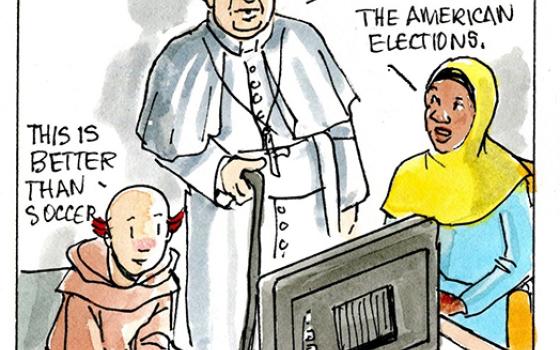The freedom to engage in peaceful protest and assembly is an important human right. Each November, I join thousands in a protest vigil in Fort Benning, Ga., to demand the closure of a U.S. military academy formerly known as the School of the Americas.
This institution, now known as the Western Hemisphere Institute for Security Cooperation, has trained Latin American officers responsible for the killing of tens of thousands of innocent civilians. We speak out to remember those who have died and to give a voice to those who face grave danger. During our vigils, many have been jailed for six months or more simply for entering academy property. But each year, we return to proclaim that the U.S. government's role in perpetuating violence is unacceptable.
Over the last several years, daring protest movements have emerged around the world, from Cairo to Santiago, Chile, to Wall Street. Recently, much attention has been paid to protests in Venezuela involving mostly young people from relatively high-income families. Tragically, since these protests started in early February, at least 40 people have died and hundreds more have been injured.
Much media commentary has falsely characterized these protests as peaceful and as motivated primarily by inflation, shortages and high crime. While some have been peaceful, many more have been violent and caused injury and death. Though Venezuelan state security forces are allegedly responsible for some casualties, protesters appear to have caused many other deaths.
And not all the demonstrations are driven by a democratic agenda. While some protesters have legitimate motives, key protest leaders, such as Leopoldo Lopez, have demanded the departure of President Nicolás Maduro even though he was freely and fairly elected just a year ago. Three generals were recently arrested for supposedly planning a coup.
The right to protest is not the right to violently oust a democratic government, a distinction that policymakers in Washington don't always seem to grasp. In March, 28 Latin American governments supported an Organization of American States resolution of "solidarity and support" for Venezuela's "democratic institutions." The U.S. government refused to sign, laid all blame for violence on the Maduro government, and threatened sanctions.
It's an all-too-familiar situation. In April 2002, violent protests on Caracas streets set the stage for a short-lived coup by a military officers, including SOA graduates. Some of the same opposition leaders behind the recent protests were involved in the 2002 coup, which unraveled after hundreds of thousands of people protested. The U.S. government supported the coup and tried to get other governments to recognize the coup regime.
The U.S. has a long history of supporting antidemocratic, violent tactics targeting left-leaning movements in the Americas. SOA graduates in Central American, U.S.-backed death squads and military dictatorships tortured and murdered dissidents. Under Presidents George W. Bush and Barack Obama, the U.S. has supported coup regimes in Venezuela, Haiti and Honduras. The 2009 Honduras coup was executed by another SOA graduate, and the United States was practically the only government to back flawed elections held under the coup regime.
Regarding U.S. policy toward Venezuela, a 2006 U.S. diplomatic memo published by Wikileaks reveals ongoing subversion of democracy. It outlines a strategy in which U.S. funding was to be used for "penetrating [late president Hugo] Chavez' political base," "dividing Chavismo," "isolating Chavez internationally" and creating organizations opposed to the government. The U.S. spends millions each year supporting groups that have, in recent years, backed unconstitutional "regime change."
Fortunately, a large sector of Venezuela's opposition now appears to reject these tactics and has criticized the violent protests. Opposition leader Henrique Capriles Radonski recently stated that "through violent means we won't achieve change." He and other leaders have begun a dialogue with the government that Maduro first called for in mid-February.
Maduro has also asked for high-level dialogue with the U.S. government. As the two countries currently lack ambassadorial relations, Maduro has suggested an exchange of ambassadors.
The Obama administration should seize this opportunity. Instead of further isolating itself through aggressive talk of sanctions, the U.S. should engage with Venezuela and support peace and dialogue. As Uruguayan President José Mujica recently said, "The first thing that Venezuela and all of Latin America need is to be respected."
[Roy Bourgeois is the founder of School of the Americas Watch.]



